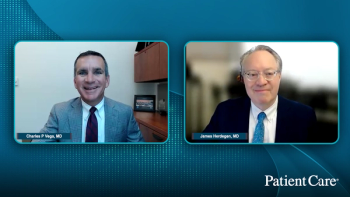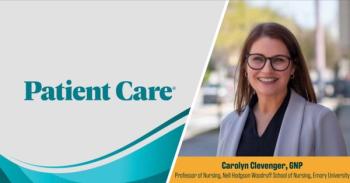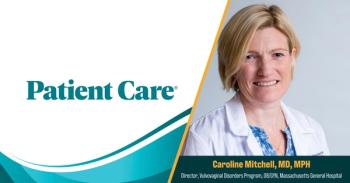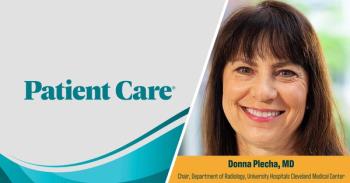
Panelists discuss how advancing NK receptor research is reshaping menopause care, emphasizing education, innovation, and patient empowerment for lasting impact.

Panelists discuss how advancing NK receptor research is reshaping menopause care, emphasizing education, innovation, and patient empowerment for lasting impact.

Panelists discuss how structured monitoring and interdisciplinary collaboration enable safe, effective integration of NK-targeted therapies into primary care.

Experts discuss how overcoming insurance barriers and providing thorough documentation are critical for initiating sleep apnea therapy, while early and ongoing patient support, including education, device fitting, and close follow-up, is essential to improve adherence and achieve lasting treatment success.

Experts discuss how overcoming insurance barriers and providing thorough documentation are critical for initiating sleep apnea therapy, while early and ongoing patient support, including education, device fitting, and close follow-up, is essential to improve adherence and achieve lasting treatment success.

Experts discuss how automatic positive airway pressure (APAP) therapy provides a personalized, accessible alternative to traditional continuous positive airway pressure (CPAP), especially amid staffing shortages in sleep medicine, with advances in connected devices and artificial intelligence (AI)–driven tools helping clinicians optimize treatment and patient support despite limited resources.

Experts discuss how continuous positive airway pressure (CPAP) remains the cornerstone of obstructive sleep apnea (OSA) treatment, emphasizing the importance of early patient education, personalized mask fitting, and clear communication about the health risks of untreated OSA to improve adherence and highlight tangible benefits such as increased energy and safety.

Experts discuss the importance of in-lab sleep studies for patients with significant comorbidities or complex sleep disorders such as parasomnias, emphasizing the comprehensive monitoring and technician oversight they provide, as well as their role in confirming or clarifying home test results; they also highlight that clear patient instructions and maintaining usual routines are vital to ensuring accurate and reliable sleep study outcomes.

Experts discuss the evolving role of home-based sleep testing in diagnosing obstructive sleep apnea (OSA), noting its growing popularity due to convenience and patient comfort, while emphasizing that device simplicity, patient education, and pretest probability are key to reliability—though in-lab polysomnography remains essential for complex or comorbid cases, underscoring the complementary value of both approaches in modern sleep medicine.

Panelists discuss how NK receptor antagonists can be strategically positioned as core nonhormonal options within the broader VMS treatment landscape.

Panelists discuss how NK receptor antagonism may improve mood and sleep quality, linking thermoregulation with broader emotional and cognitive health benefits.

Symptoms of the menopausal transition can be so disruptive that women consider leaving employment and yet many report misdiagnosis and inappropriate treatment.

Experts discuss the utility of the STOP-Bang questionnaire as a simple, sensitive screening tool for obstructive sleep apnea (OSA) in primary care, highlighting its strengths and limitations, the importance of clinical judgment in interpreting results, and the value of complementary tools such as the Epworth Sleepiness Scale in supporting a comprehensive, patient-centered approach to OSA diagnosis and management.

Experts discuss the widespread underdiagnosis of obstructive sleep apnea (OSA), emphasizing its significant impact on quality of life and comorbid conditions, the critical role of primary care in early detection, the importance of family input in recognizing symptoms, and the need for proactive, multidisciplinary strategies to ensure timely diagnosis and effective management.

Clevenger, a professor of nursing at Emory University, shares practical strategies to manage agitation in Alzheimer disease, emphasizing that this symptom is treatable.

Panelists discuss how NK1 receptor antagonists show promise beyond VMS, suggesting wider therapeutic potential across neurological and systemic conditions.

Panelists discuss how NK receptor antagonists deliver fast symptom relief with strong safety profiles, improving adherence and clinical confidence in their use.

Nearly one-third of caregivers hesitate to discuss agitation in a patient with AD. Emory's Clevenger, shares why and how clinicians can proactively address this barrier.

Emory's Clevenger discusses the neurotransmitter dysregulation behind agitation in AD and why memory-focused care doesn't address behavioral symptoms.

Clevenger reviews survey findings behind the recent report "The Agitation Blindspot in Alzheimer’s Care."

Panelists discuss how elinzanetant offers a safe, effective nonhormonal option for managing VMS in women receiving endocrine therapy for breast cancer.

Panelists discuss how elinzanetant demonstrates strong efficacy and safety across trials, reinforcing neurokinin modulation as a viable core treatment for VMS.

Cochrane shares her own research findings on how clinician specialty shapes menopause care and highlights gaps in hormone therapy prescribing.

Panelists discuss how dual NK3/NK1 receptor antagonism may expand therapeutic benefits by targeting multiple neural pathways involved in VMS and mood regulation.

Panelists discuss how NK3 receptor antagonism through fezolinetant offers effective, rapid relief from VMS with a strong safety profile and nonhormonal benefits.

TMS: Harvard's Caroline Mitchell, MD, MPH, questions the direction of genitourinary syndrome research priorities and reflects on FDA's removal of HRT warnings.

Women increasingly seek evidence-based menopause care as awareness grows, yet many still suffer from untreated vasomotor symptoms.

Harvard's Caroline Mitchell, MD, MPH, explains how common OTC products can worsen vulvovaginal symptoms and the importance of a targeted history in GSM care.

Access, cost, and clinician awareness remain significant barriers to implementing supplemental breast screening, according to Plecha.

Breast imaging expert Donna M. Plecha, MD, explains the FDA's dense breast notification requirement and when to recommend supplemental MRI screening.

Mitchell highlights hormone therapy prescribing for primary care: treatment algorithms, vaginal estrogen safety, and when progestins aren't needed.